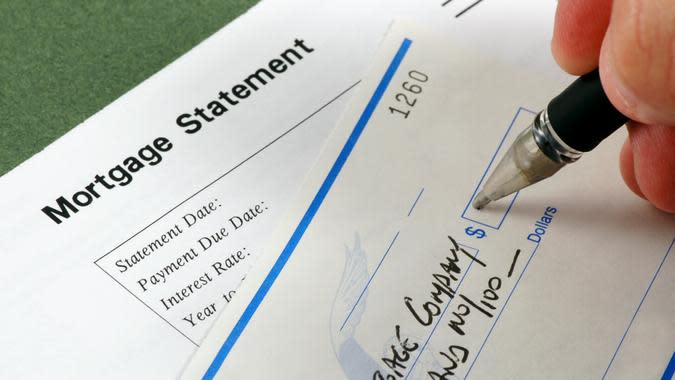20 Things To Do in a Falling Stock Market

With the S&P 500 down nearly 20% on the year and the NASDAQ doing worse, even the most stoic investors are wondering when stocks will hit bottom. You don't have any control over when the market will turn around, but you can control what you do while you wait.
Learn: 13 Ways To Make $100 in Just a Day
Find Out: 9 Bills You Should Never Put on Autopay
GOBankingRates asked the experts what steps average investors should take to protect themselves from losses and even pursue gains in the current bear market. They gave the following advice.

Relax
Despite all the bad news, stay cool and remember that downturns are a natural part of the cycle -- now is not the time to panic and make fear-based decisions.
"Investors should expect volatility and market ups and downs," said Sterling Raskie, vice president of client engagement with Blankenship Financial Planning and a senior lecturer of finance at the University of Illinois at Urbana-Champaign. "If an investor is properly diversified -- holding a portfolio of low-cost index funds, for example -- then they shouldn't fret about fluctuations. They can rest easy knowing that this is the norm, not an exception."
More: 6 Alternative Investments To Consider for Diversification in 2022

Turn Off the TV
One of the best things you can do when the market turns south is to tune out the media hype, said Katie Brewer, CFP, who created the financial services site Your Richest Life.
"Yes, this sounds like funny advice, but staring at a panicked news anchor that is proclaiming that the stock market is crashing will only make you feel nervous and unsure about your long-term strategy," she said. "Turn off your TV, and go for a walk."

Don't Act on Impulse
If you don't let the media freak you out, you'll be less likely to make impulsive decisions, which are usually bad decisions when investing is involved.
"Stock markets outperform in the long-term," said Wendy Nissan, co-founder of DIY.Fund, a site that helps investors create and maintain stock portfolios. "The 20-year return on the S&P is 9.9%, and that's including the market crash of 2008. Individual investors have only returned 2.5% in that same time period in large part due to fear. Take a deep breath, and don't do anything impulsively."

Stick With Your Investment Strategy
Downturns are notoriously bad times to change horses -- stick to the investment strategy you committed to when the market was up.
"It is easy for investors to want to sell their stocks and hold cash, but market timing can be an exercise in futility and frustration," said Cameron J. Penney, a certified financial planner and founder and managing partner of Penney Financial. "In fact, the average intra-year drop of the S&P 500 in the past 36 years is 14.2%. However, in 27 of those 36 years, the S&P 500 still returned positive for the calendar year."

Know What You Own
When the market is up, you can't check in with your brokerage balance frequently enough. When the market turns, however, it's natural to tune out -- but you shouldn't.
"Do not put your head in the sand," said Nissan. "Even if you don't want to see the value of your holdings, you need to know where you are invested, how risky your holdings are and if this is how you want to be positioned in this market."

Review Your Asset Allocation
Nearly all of the experts who spoke with GOBankingRates agreed that what's in your portfolio has a lot to do with what you'll get out of it in a bear market.
For example, people who went all-in on the growth-heavy NASDAQ during the pandemic boom are suffering now that tech is down. If you haven't checked in with your portfolio recently, revisit your holdings and adjust with the help of a financial professional.

Rebalance Your Portfolio
Assuming that you have a financial plan and an asset allocation strategy in place, a stock market downturn is a great time to review your allocation as well as rebalance if needed. You can certainly buy and sell holdings to get things back in balance. Other methods might include adjusting ongoing contributions to your 401k and committing new cash to the underweight areas of your portfolio.
And don't forget to review your entire portfolio as a whole -- this includes taxable accounts, IRAs and your 401k. Even experienced investors can forget to rebalance their portfolios.

Meet With a Financial Planner or Advisor
If you tend to panic during periods of market uncertainty, a professional financial advisor or planner could help calm you down and also help you rebalance or reallocate your portfolio, if necessary.
"If you find yourself wanting to adjust your allocation only due to current market conditions, you may find value in working with a financial planner to align your goals and investment strategy," said Gregory Curry, founder of Pillar Financial Advisors.

Make Sure You Have Cash in Your Portfolio
With inflation still near 40-year highs, you might think the only thing that cash can do is lose value. The truth is that cash is an important part of any good investment strategy.
"You should always have a cash position in your portfolio," said wealth manager Kirk Chisholm, a wealth manager and principal at Innovative Advisory Group.
Cash doesn't necessarily pay well, but it does lower your risk and allows you to invest when the stock market dips.
"Many investors worry about inflation eating away at their cash," added Chisholm. "However, when inflation is essentially zero, you don't have to worry about losing your purchasing power."

Educate Yourself on Stock Market Risks
When you're up to speed on the stock market's historic ups and downs, the downs don't seem as frightening. Before you panic over what's happening now, learn about what came before.
"Becoming more familiar with the risks that could affect an investor's portfolio value might put an investor more at ease when the value drops substantially," said Penney. "For example, knowing that the broad stock market has a history of large swings and volatility -- and that 10 percent downturns are not abnormal -- can help investors remain calm in a falling market."

Read Investment Books
Don't limit your investing education to the history of market downturns. The more you know about investing, the more informed your decisions will be -- and that applies to both bull and bear markets.
"If you don't understand how the investment markets work, you're much more likely to panic," said Barbara A. Friedberg, a veteran portfolio manager and author of "Personal Finance: An Encyclopedia of Modern Money Management." "Panic can lead to making rash decisions, like selling at a bottom and upending your entire investment plan."
She recommended two of her favorite investment books for panicky investors: "The Elements of Investing" by Burton G. Malkiel and Charles D. Ellis, and "A Random Walk Down Wall Street," also by Malkiel.
"The more educated you are, the less you're likely to panic when markets tank," said Friedberg.

Harvest Tax Losses
You don't lose until you sell -- and believe it or not, locking in losses is sometimes the best thing to do.
"If you have investments in taxable accounts that are worth less than you paid for them, you may be able to realize those losses for tax purposes without affecting your allocation," said Curry. "There are specific tax rules, so it's always best to consult with your tax advisor prior to harvesting your losses."

Focus on Your Long-Term Goals
Remember that you're in it for the long haul and that bear markets come and go. This, too, shall pass -- keep your eyes on the prize.
"Hopefully, your investing aligns with your longer-term life goals and aspirations," said fiduciary financial advisor Russ Thornton, who provides financial planning services through Wealthcare for Women. "And it would be awful to let your long-term plan become derailed by a short-term investment decision because the market has fallen over the course of a couple of weeks. Instead, revisit your plan and remember why you're investing in the first place. Typically, emotionally important goals like retirement, college for your kids or leaving something to a favorite charity can make the difference in keeping your plan -- and your investments -- on track."

Buy Stocks at a Lower Price
One thing every down market has in common is that they all offer investors the opportunity to get more shares for less money -- the goal, after all, is to buy low and sell high.
"Think of a falling stock market as an opportunity to buy your favorite stocks on sale," said Nissan. "If your fundamental view on a company hasn't changed, then use the cheaper price to buy stocks that now have more upside than they did last year."

Increase Your Contributions to Your Savings or Retirement Accounts
Raskie also agrees that you should be an opportunist when the stock market starts to dip. In addition to buying discounted stocks, you might also put more money into your savings and retirement accounts.
"These buying opportunities can enhance future wealth greatly," he said. "Some ways to do this are increasing 401(k) contributions, IRA contributions or putting more into your child's 529 savings plan."

Accelerate Your Mortgage Payments
No one is saying not to invest your money during a downturn, but you might consider investing in future interest payments never made on your home loan.
"Since it may be difficult to make even 3% or 4% in a falling stock market, the one guarantee you do have in terms of making a rate of return is to accelerate paying off your mortgage," said Ted Jenkin, a certified financial planner and co-CEO of oXYGen Financial. "It doesn't matter when you expect your real estate to [go] up or not. The guarantee is in the interest you are saving by paying down the mortgage quicker."

Consider Using Options
Options can help mitigate risk -- but only if you don't treat them as a casino game.
"Options were originally created to manage risk on investments," said Chisholm. "However, they are perceived as risky because some investors use them to speculate rather than manage risk. Covered calls, zero-cost collars, spreads and naked puts can all provide you with some downside protection if you use them the right way. In a bear market, while volatility is rising, consider using options to protect your portfolio."

Don't Lose Sight of Your Stock's Underlying Business
Changes in market sentiment can cause a stock to drop, but that doesn't mean the underlying business model or fundamentals of that company has changed at all. If the factors that made you buy the stock in the first place are all still true, don't let market volatility cloud your view of what makes the company successful and will probably continue to do so in the future.

Revisit Your Withdrawal Rate
If you're a retiree, you should revisit and -- if needed -- revise your annual withdrawal rate from your retirement nest egg. It's likely that some retirees allowed their spending to creep up as their holdings enjoyed endless gains during the bull market of the 2010s and the pandemic boom that followed. Now that your fortunes are waning, your spending should be, too.

Take Stock of Where You Are
And lastly, review all of your investment accounts and see the extent of the damage that has actually been done. Investors who are well-diversified have probably been hurt but not to the extent of those with a heavy allocation to equities and other areas that have been hit.
More From GOBankingRates
Andrew Lisa and Joel Anderson contributed to the reporting for this article.
This article originally appeared on GOBankingRates.com: 20 Things To Do in a Falling Stock Market

 generic
generic 